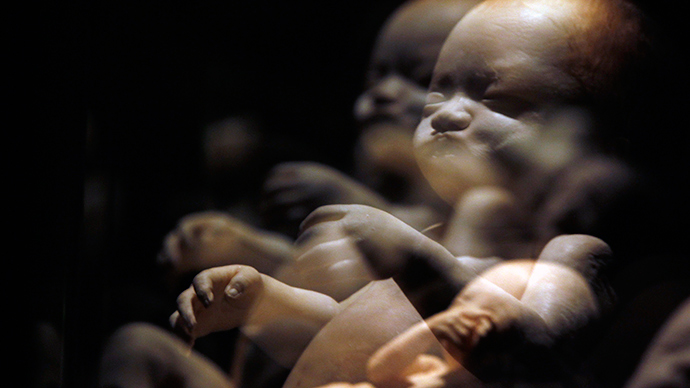Gene causing stillbirth in late pregnancy identified

Scientists in Sweden have identified the gene that causes a syndrome affecting the muscles in a fetus. It lessens the movement of a baby in the uterus, reduces growth, deforms limbs and underdevelops lungs, which eventually causes late fetal death.
The research, conducted by the Swedish SciLifeLab (Science for Life Laboratory), together with Uppsala University and Uppsala University Hospital studied a family, who have suffered stillbirths - with parents having had several children affected with the syndrome known as FADS (fetal akinesia deformation sequence). Fetuses who had it displayed no movement from the 17th week of pregnancy, as well as extended knee joints, flexed hips and elbows, and clenched hands - the study published in the Journal of Medical Genetics, says.
READ MORE: French surgeons successfully operate
on 20-week fetus to correct spina bifida
Using modern sequencing methods, scientists have identified the mutation that causes the disease. Having studied the family DNAs, they found a mutation in a gene called MuSK (muscle-specific tyrosine kinase receptor), which regulates neuromuscular junction formation and maintenance.
Because of the mutated gene, signal transmission between nerve ends and muscle fiber was not working properly, explaining the FADS symptoms, researchers said. Previous studies in mice have shown that rodents lacking the MuSK protein had similar symptoms to those of affected children - they did not move as they should have, could not breathe and died shortly after birth.
It is the first time that a mutated gene has been associated with FADS, which is characterized by decreased fetal movement and developmental anomalies, eventually leading to stillbirth in late pregnancy or a child's death shortly after birth.
READ MORE: World first: Swedish woman gives birth
after womb transplant
"There are several reasons why the fetuses die in the uterus, such as diseases of the mother, infections, problems with the placenta or umbilical cord, chromosomal abnormalities and malformations," Karin Eurenius, chief physician at the University Hospital and co-author of the article said, adding that in up to half of deaths before birth, the exact cause cannot be identified.
READ MORE: Scientists create artificial human
sperm, eggs from stem cells
Out of 1,000 births in Sweden, about 4 cases of stillbirths in late pregnancy (after 28 weeks) are registered. Researchers say they do not know how common the mutation they've discovered is, but believe it to be quite unusual.
"For a fetus to be affected, it must inherit a mutated variant from each parent - and the chance that two people with the mutated gene will meet each other is seen as quite small," researcher Maria Wilbe said.
The study could help families who have suffered a stillbirth get an accurate genetic diagnosis, and be able to explain the cause of such child deaths and prevent them in the future.
READ MORE: Erasing memories and landing on a
comet: How science rocked in 2014














